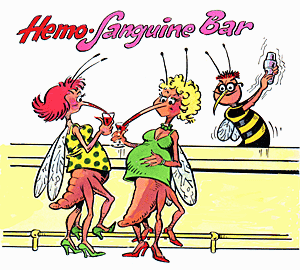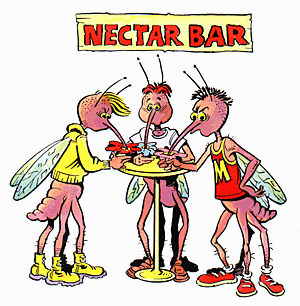Help! Mosquitoes
I thought this might be a good place to ask, so does anyone know how to keep the little beasts off oneself? 
Whenever I go back to Kch, I'm like a walking pharmacy! I've got repellants, anti histamines, steroid cream, piezo, etc + we need to have to 'sio bung-hio' to keep them off. I've been told that mosquito sprays, 'bung hio', etc are only purchased when I go back. It's a nightmare..
***************************
A little bit of information about the mossies. This is what wordsource.info has got to say about the little beasts.
Among mosquitoes, it has been established that only the females desire and extract blood.
Although I travel incognito,
I can't deceive the smart mosquito;
While others also have corpuscles,
Mine are the ones toward which she hustles;
My blood is thin and I have asthma;
She doesn't care, she wants my plasma.
Mosquitoes seem to love the rind of me,
The front, the sides, and the behind of me;
I've tried to think why they're so smitten,
And as I think, once more I'm bitten.
-Dick Emmons
Male mosquitoes drink only sugary fluids such as flower nectar. Both in the wild and in the laboratory, mosquitoes will visit certain flowers and will feed on fruit placed in their cage.
Since they vigorously probe the flowers of some plants, and can distinguish between different types of sugars, they play a role in the pollination of certain plants.
The females will also drink sugary fluids, but when hungry females are given a choice between sugar water and blood, they will always choose blood.
If males are offered the same choice, they will always drink the sugar water.
Since male mosquitoes do not suck blood, they also do not transmit diseases. Like the males of many other insect families, they are important for just one reason, and then they become superfluous.
The female usually needs to mate just once in her life. She stores sperm in her body and fertilizes her eggs at the moment when she lays them. Shortly before or after mating, she takes a meal of blood to provide the eggs with protein.
When the eggs are mature and ready to be fertilized, the female searches for a suitable place to lay them which is usually water that is full of decaying matter that includes bacteria and minute organisms.
Some mosquito species lay their eggs in places that are likely to contain water in the future; such as, rusty coffee cans, old discarded tires, etc. In such situations, the eggs lapse into a state called diapause and they will not hatch until this dormant period passes, and the water level, temperature, and oxygen content are just right.
The eggs of some species can survive for years in diapause, even in sub-freezing temperatures.
After hatching from the eggs, they swim about and begin to feed by sweeping the water with two large fan-shaped bundles of chitinous bristles (or brush-like structures) at either side of their heads.
The fans, or brushes, create currents in the water that direct food toward the larvae's mouthparts and help stuff the food into their deeply concealed mouths.
The larvae are omnivorous; feeding on bacteria, pollen, microscopic plants, and a wide variety of other minute things.
About 150 species live in the United States, more than 3,000 worldwide.
They don't really sting, in the sense of a hypodermic needle piercing the skin.
They saw their way through instead, using four cutting stylets kept in a protective sheath along with a duct that carries anticoagulant into the wound and a tube that carries blood out.
Mosquitoes fly into the wind, picking up scents which lead them to their victims. Just about everything attracts them, including the carbon dioxide we exhale.
Mosquitoes will even suck the blood of birds, frogs, turtles, snakes and just about every warm-blooded animal. In fact, some mosquitoes prefer their sources of blood to be other than human. There are many species of mosquitoes that prefer the blood of birds or other animals. In fact, some species have been observed to feed on numerous mammalian groups, on a variety of reptilian species, and even on other kinds of insects.
Anthropophilic mosquitoes are attracted to certain ranges of temperature and humidity, and to carbon dioxide from the exhalation of humans.
They seem to prefer dark-colored objects to light. Certain chemical smells may also come into play; for example, components of blood and sweat such as hemoglobin and amino acids.
The best explanation of what brings the mosquito to its victim is that she simply flies upwind until she comes upon a potential victim exuding a "host beam" of warm, moist air laden with carbon dioxide.
The mosquito proboscis (long tubular mouth parts used for feeding) consists of six different shafts. Four are cutting and piercing tools; a fifth transports blood from the host; the sixth transports saliva, thought to act as an anticoagulant for the blood going in the other direction.
The saliva also transmits the organisms of malaria, yellow fever, dengue, and most of the other diseases for which mosquitoes are notorious.
When a mosquito punctures ("bites") into the flesh, one usually feels an allergic reaction to the saliva, which causes the swelling and the itch. The fact that this reaction is allergic helps explain why some people suffer more than others when their skins are invaded.
Some mosquito species are nocturnal, diurnal, or crepuscular (active at dawn and twilight). They also differ in their preferences for altitudes.
***************************





5 comments:
Citronella oil is the answer! Was introduced to this when I went to Penang in 1987. Was told to apply it liberally on exposed skin before going to a durian plantation and I did not get a single bite.Try it! Not sure where you can buy the oil in its 'pure' form in Kuching. I have bought a bottle before in Johore, and I recently bought one from an Indonesian jamu store at Parkway Parade, S'pore. You can try the 'eok chai poh tiam' in Kuching.
Citronella is used in insect repellants too.
There's a 'theory' that mosquitos tend to bite certain people more than others; in that if your body is more acidic (out of balance chemically!) then you're more prone to be 'attacked' by the mossies!
I'm one of those lucky 'chemically-balanced' person who's less proned to attract mossies, hence can negate the necessity to look for Citronella oils! Especially when there're other ppl around. Alone? They do attack me too!
An informative posting.
Em, your body's got a sweet scent and full of CO2! LOL! :)
Citronella oil is used as a fuel in the tiki torch over here when one is outside having a BBQ. It provides lighting and keeps out the mossies and can be purchased at the DIY stores.
Thanks. Have heard of Citronella but never tried it, and FH I'm NOT sitting next to you as the mossies don't like you very much!
Post a Comment